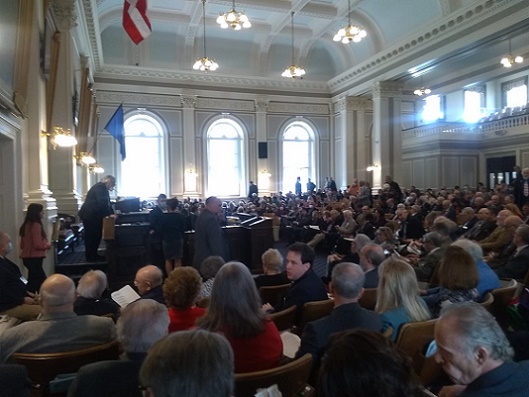To my constituents in Allenstown, Epsom, & Pittsfield:
This week my committee heard our last two Senate bills, starting with SB 224, creating children’s environmental health day. Neither the sponsor nor any supporters showed up to testify in favor; we then proceeded to a non-germane amendment addressing reciprocity for electricians’ licenses. The constituent who still worked in Connecticut admitted that he actually had not applied for a license, but assumed he wouldn’t get one. Members of the board of electricians testified that Connecticut had very similar standards to New Hampshire and the exact same language regarding reciprocity. They thought he would be accepted by the board if he applied, because of his extensive experience, and at worst would need to take a test confirming his knowledge. After that hearing, we voted to kill SB 224 and not take up the amendment.
We also heard SB 450, a housekeeping bill on the Prescription Drug Affordability Board. AARP and others came out in favor of what they hoped the bill would do (lower drug costs for their members) not caring that the board was investigative and intended to clarify drug pricing for government purchases. We voted, 10-9, to send it to interim study with HB 1566, which also addresses this board.
We want to thank NH State Rep Carol McGuire for this Op-Ed. If you have an Op-Ed or LTE
you would like us to consider, please submit it to Editor@GraniteGrok.com.
We discussed SB 330, amending it to include funding as a topic for the study committee, creating an OPLC oversight committee modeled on the existing HHS oversight committee, and deleting all references to the Boxing and Wrestling Commission. As amended, we recommended the bill 19-0. SB 357, mental health training for first responders, had the promised amendment to include dispatchers in the training, and a clear exemption for existing officers, and then passed unanimously.
SB 383, land surveying, had an amendment developed by the subcommittee, which clarified the non-resident licensing (and put it in the correct statute) and deleted the authority to investigate and punish non-licensed surveyors, which was not acceptable to the committee. It, too, passed unanimously. SB 277, on emergency and temporary licenses, had a subcommittee amendment as well – but some members objected to the exemption from continuing education. We revised the amendment and recommended it, again unanimously.
SB 282, on acupuncture licensing, had an updated amendment that addressed HB 1192, the similar bill we passed earlier. HB 1192 passed the Senate, so SB 282 only makes a few further language changes and a note that it passes after HB 1192. SB 358, eczema awareness month, was debated over my non-germane amendment to revise the administrative rules process. It passed, 14-5, with the opposition opposed to any changes to the process – since it’s working so well, of course!
SB 226, a recruitment program for state employees, was unanimously recommended to pass.
SB 397, which consisted of two interstate compacts, one on mental health counseling and the other on the placement of children, had an extensive debate. An amendment, based on the subcommittee work, deleted the placement compact (which was the 2009 revision to a 1960s vintage compact New Hampshire has been in for decades) and added some specific language about placement with parents, across state lines. (This was a result of some of the miscues in the Harmony Montgomery Your State House Page 1 of 2 April 29, 2022 case, and was an urgent priority for the governor and most of the committee on children and family, which worked on this with us.) The updated compact would not likely be finalized soon – it requires 35 states to adopt it before it’s effective, and only a dozen (? not sure – we got different numbers from different members, but it didn’t seem to matter since it was well below 35) or so have joined up so far. This amendment passed 10-9 (party line); a subsequent amendment to delete the mental health compact was debated and failed, 6-13. I supported the deletion since I have long considered compacts to be unconstitutional: they all declare that their rules have the force of law in all member states, but the New Hampshire constitution forbids any laws not voted on by the people or their elected representatives. An ought to pass motion with only the first amendment failed, 8-11. I decided to let this sit for a while and went on.
SB 382, requiring telehealth providers to have a New Hampshire license, had an extended debate. The supporters of the bill thought that it was implied by current law (in particular, the physician’s compact, which defines that treatment takes place at the location of the patient, not the doctor.) The opponents wanted people to be able to see any provider they wanted, wherever the provider was, and thought that many would not want to bother getting an NH license. I could see both sides, but realized that this only mattered if there were a problem: a happy patient would never care! A motion to kill the bill failed, 9-10; after more debate, we voted to pass it, 13-6. I had supported killing the bill (it seemed everything was OK at present) but voted to pass it so that the law was clear as to what state’s laws applied to telehealth operations.
SB 274, prohibiting project labor agreements, was killed, 12-7, with three Republicans joining all Democrats in opposition. After a break, we unanimously reconsidered our last motion on SB 397, ought to pass with only the mental health compact. The second vote came out 16-3, with the Democrats realizing the children’s compact was never going to pass the committee, and getting the mental health compact was a higher priority.
The redistricting committee met on SB 200, which is now the congressional district map. The minority presented their previous map (current districts with Hampton switched from CD1 to CD2.) This was criticized as splitting economic communities and counties, and even as not being the “least changed” as they could have moved a few towns in the North Country and resulted in a lesser deviation between the districts. It failed, 7-8. The Republican mapmaker presented a new map, concentrating CD1 in the I-93 corridor, which had several advantages: population deviation of 5 people, only two counties split, and all economic communities kept together (except ones already split by county lines.) The political competitiveness was excellent, as in 2020 the Republicans would have won by 50.5%. Can’t get much tighter than that! The Democrats criticized it as moving too many communities from one district to another, and not being “competitive.” After some discussion, this map passed, 8-7 (all votes in this committee are on party lines.)
 Representative Carol McGuire
Representative Carol McGuire
carol@mcguire4house.com
782-4918
